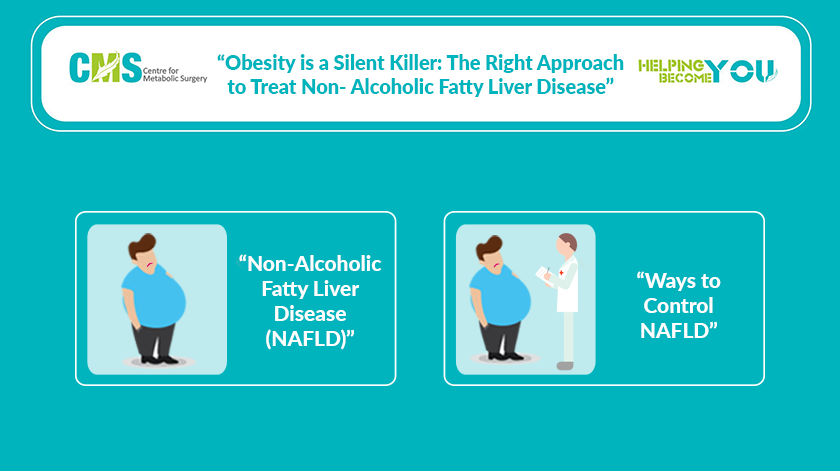
Sedentary lifestyles, irregular eating habits, and physical inactivity not only increase your weight disproportionately but also makes you prone to metabolic risk factors such as obesity, hypertension, diabetes, and dyslipidemia. A high reading on the BMI scale (<35) can cause the liver tissue to be inflamed and damage the liver cells. Obesity can reduce a body’s resistance to insulin keeping the levels of blood sugar and blood fat (cholesterol) high. Hence, when obesity disrupts the normal functioning of a liver, the risk of developing Non-Alcoholic Fatty Liver Disease (NAFLD) is high. It is a condition in which the liver regulating the amount of sugar and fat in the blood, becomes overburdened, and starts depositing excess fat in its own liver cells. Obesity and NAFLD are interlinked, and to combat the risks of the latter, a person must consult a doctor, make certain lifestyle changes, and if need be, seek medical intervention.
NAFLD is a serious lifestyle disease and often goes unnoticed. Most people hesitate to consult a doctor and consider obesity to be a harmless weight problem. Obesity, however, fails the liver in many ways increasing risks of liver failure and ultimately causing liver cancer. NAFLD is divided into four stages— simple fatty liver (steatosis), non-alcoholic steatohepatitis (NASH), fibrosis (scarring)and cirrhosis (stage of permanent liver damage). In NASH there is building up of fat in the liver cells and inflammation, disrupting the normal functions of the liver. The final stage, cirrhosis is the most severe stage where the liver shrinks and becomes scarred and lumpy causing a permanent damage. Any negligence on the part of a patient can cause an irreparable damage— liver cancer. The most effective treatment option for NASH is weight loss. Weight reduction by 10 % is needed to reduce liver inflammation.
In the initial stages, a doctor would primarily suggest certain modifications in the diet— low-fat, high-carbohydrates and fiber-rich foods etc. Sustaining the dietary regime along with regular physical activity like walking or some form of athletics can go a long way in mobilizing liver fat. However, for patients who cannot control their medical condition with lifestyle changes alone, clinical intervention is the most appropriate route. To control morbid levels of obesity, you may be advised to undergo “Bariatric Surgery”. The surgery involves shrinking your stomach to the size of a “banana” without compromising on the absorption of essential minerals. Weight loss achieved by bariatric surgery has been shown to improve not only the liver inflammation but also liver fibrosis. With the reduction in levels of obesity, managing weight will not only combat fatty liver disease but can also help in keeping other metabolic disorders like cardiovascular diseases away.
Contribution by Dr.Amit Gupte, Consultant Gastrointestinal surgeon, Wockhardt Hospital, Mumbai Central.

Post a comment
Your email address will not be published. Fields marked (*) are mandatory.